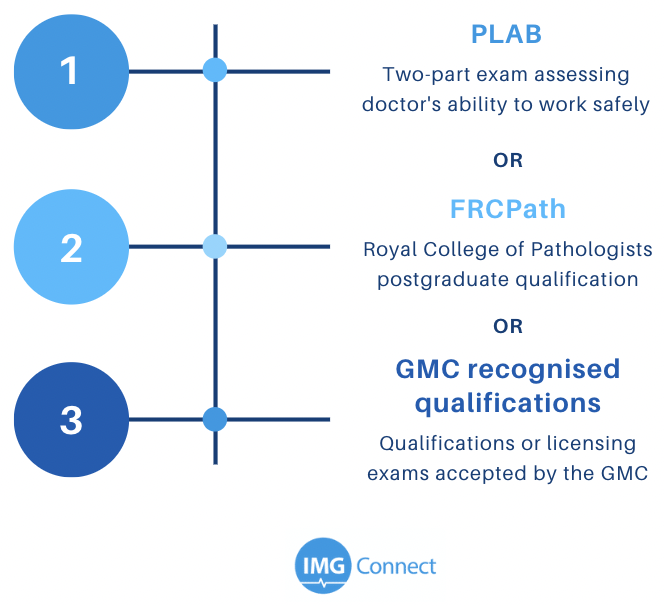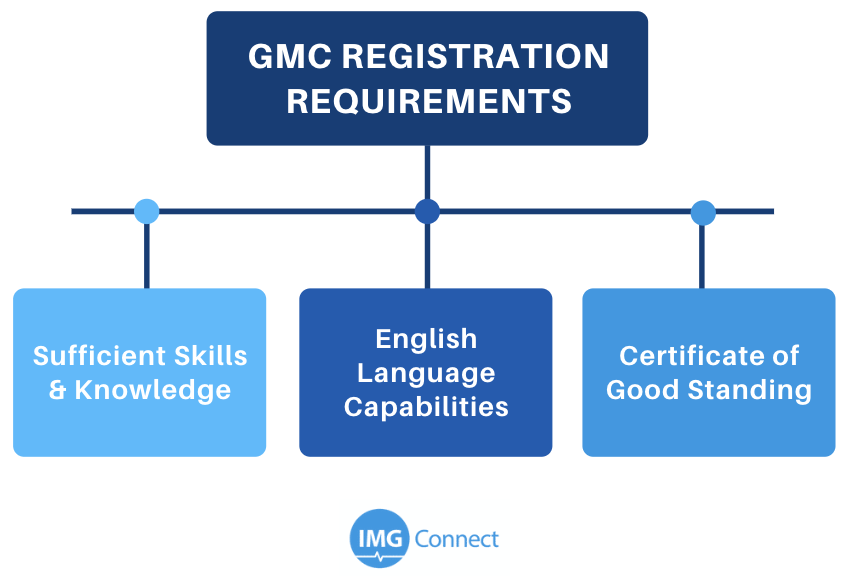A Microbiologist’s Route to the UK
- November 10, 2022

There are several routes a microbiologist can take to register with the GMC and practice in the UK.
Microbiologists looking to secure a job in the NHS must satisfy certain criteria before to be eligible for GMC registration, which is a requirement to work in the UK. This generally depends on where you received your training, and the qualifications you hold.
In this blog, we’ll be giving you a snapshot of the steps you need to take to begin your journey to the UK as an overseas microbiologist. We’ll be covering the following:
- What is the GMC?
- What are the requirements for GMC registration?
- How do I demonstrate my knowledge and skills as an EEA microbiologist?
- How do I demonstrate my knowledge and skills as a non-EEA microbiologist?
- How can I demonstrate my English language skills?
- What is a certificate of good standing and how do I get one?
- How do I register with the GMC?
- Will I need a visa to work in the UK?
Skip ahead to the relevant section if you know what you’re looking for.
The General Medical Council
The GMC is the body in the UK which is responsible for licensing and revalidating every doctor. Therefore, for every doctor practicing in the UK, GMC registration is essential – you cannot practice in the UK without full GMC registration with a license to practise.
The primary responsibility of the General Medical Council is to ‘protect, promote and maintain the health and safety of the public’ in addition to improving medical education and practice across the UK.
Requirements for GMC Registration
Registering with the GMC is a multi-stage process, including key timings, actions and documents. For full GMC registration, international doctors must provide evidence of:
Skills & Knowledge for EEA Microbiologists
For microbiologists who trained in an EEA country (all countries inside the EU, also Lichtenstein, Iceland, Switzerland & Norway), you may be able to use your primary medical qualification (PMQ) or specialist qualification to register with the GMC.
Basic Medical Training
If you meet the requirements for basic medical training, you would be eligible for full registration.
You will not need to demonstrate your medical knowledge and skills to work as a doctor in the UK and would therefore not need to complete any additional skills and knowledge tests to register for a license to practice.
Specialist Training / Residency
If you meet the criteria for entry onto the Specialist Register, then once you have completed the GMC application process, you would be granted Specialist Registration in microbiology and can be appointed as a substantive or permanent consultant in the NHS.
Therefore, for European microbiologists, using your primary medical qualification (PMQ) or specialist qualification is most likely the easiest route to becoming GMC-registered and being able to practice microbiology in the UK.
To find out if your country’s qualifications will allow you to register for either GMC registration; check the relevant GMC page here.
If your training does not meet the GMC requirements for general or specialist registration, other routes you may consider to GMC registration as listed below.
Skills & Knowledge for non-EEA Microbiologists
If you qualified as a microbiologist outside the EEA, then you will have to demonstrate that both your medical knowledge and skills meet the level required to practice safely in the UK.
IMG microbiologists can demonstrate skills and knowledge through three main routes:

PLAB
PLAB or the Professional & Linguistics Assessment Board is a two-part exam that assesses a doctor’s ability to work safely as an SHO in the NHS, as such it does not demonstrate ability in microbiology specifically. For this reason, PLAB tends to be a route for junior doctors who have not already chosen their field of specialisation in medicine.
That said, for some senior doctors PLAB can be an attractive option, offering a quicker route to the UK, whilst still securing competitive salaries. If taking this option, microbiologists can then take up training or a more senior post once they have established themselves in the NHS. Take a look through our comprehensive guides on PLAB.
FRCPath Microbiology
The Royal College of Pathologists is the professional body that regulates the specialism of microbiology in the UK, and Fellowship of the Royal College of Pathologists (FRCPath) is the full qualification attainable by examination.
For overseas doctors, attaining FRCPath will satisfy the knowledge & skill criteria for GMC registration and facilitate application for more senior roles in UK pathology. Take a look at IMG Resources library for a complete guide to FRCPath to learn more.
GMC-recognised or equivalent qualifications
Some overseas qualifications and licensing exams are recognised by the GMC and accepted for registration purposes.
To find out if your qualification is accepted by the GMC, take a look at our blog: GMC-accepted postgraduate qualifications.
English Language Testing
Both EEA and non-EEA microbiologists, regardless of experience and country of origin, must demonstrate that they have a sufficient grasp and competence of the English language. This can be done by passing either the IELTS (International English Language Testing System) or the OET (OET – Occupational English Test). Detailed guides to these tests can be found below:
IELTS – a guide for overseas doctors
OET – a guide for overseas doctors

For doctors who have at least two years of their most recent experience in an English-speaking country, you can use a reference from your current employer or employers over these two or more years to demonstrate competence of the English language. This would exempt you from sitting an English language exam.
Certificate of Good Standing
All doctors registering with the GMC must provide a certificate of good standing from each medical regulatory authority they’ve been registered or licensed with in the last five years.
The medical regulatory authority may send you a certificate of past good standing if you're not currently registered or licensed with them. You can find out which medical regulatory authority to contact via the GMC website here.
If there's no medical regulatory authority in the country to issue a certificate, the GMC will give you further advice once your application has been assessed.
Please note that each certificate is only valid for three months from the date it's signed and must be valid when we approve your application.
Applying for GMC Registration
Once you’ve completed your English language exam, you can now apply for full GMC registration with a license to practice. For registration, you must provide evidence of:
English language capabilities - either your IELTS, OET or an approved reference from your current employer
AND
Certificate of good standing – the certificate from your medical regulatory authority which demonstrates good standing
AND
(EEA microbiologists) Sufficient skill and knowledge – as an EEA microbiologist, this would either be your recognised EEA qualification
(Non-EEA microbiologist) Sufficient skill and knowledge – as a non-EEA microbiologist, this would either be PLAB, FRCPath or a GMC-approved qualification.
To understand the registration process more fully, read our article on GMC registration for overseas doctors here.
Visas
IMGs relocating to the UK will need to apply for a visa from the Home Office.
A Tier 2 visa is the document given to a skilled worker by the UK Home Office following a job offer from a UK employer with a valid Tier 2 Sponsorship License. The list of valid Tier 2 Sponsors can be found here.
Understand Tier 2 visas and Certificates of Sponsorship in depth by taking a look at our article: Tier 2 Visa application process & documents needed.
Wondering whether you can relocate with your family? Take a look at our blog on the Tier 2 dependent visa below: Tier 2 Dependent visa - Can I bring my family with me to the UK?
There you have it! Hopefully this clarifies any worries or doubts you may have on your route to the UK as a microbiologist planning a career in the NHS. If you have any questions or wish to know more about the microbiology job market, then get in touch with our team.
For regular news and updates on the Royal College and all things pathology, follow IMG Connect on social media using the links below:
Relevant Jobs
An NHS teaching hospital in the West Midlands is looking for a Locum Consultant in Microbiology with an interest in clinical microbiology, infection control, and antimicrobial stewardship. The Microbiology department comprises a team of 5 consultant microbiologists and is supported by a large team of middle grade doctors. This Microbiology job is open to both international applications and UK-based doctors, though those with European Specialist or FRCPath qualifications are most encouraged to apply.
Anyone requiring portfolio support (formally known as CESR) can have their required support discussed on a case by case basis.
JOB REQUIREMENTS AND DETAILS
FRCPath (or equivalent) and significant experience in microbiology and infectious diseases are required for this role, and anyone with an interest in antimicrobial stewardship and infection control should apply. The salary will be between £105,504 and £139,882 dependent on experience or grade.
CORE DUTIES OF THIS ROLE
-
Provide clinical microbiology advice for inpatients and outpatients, including infection control and antimicrobial therapy recommendations.
-
Participate in multidisciplinary team meetings such as OPAT, diabetic foot, and spinal infection MDTs.
-
Be part of a 1:7 on-call rota, providing microbiology advice out-of-hours to hospital and community services.
-
Contribute to laboratory report validation, audit activities, and CPD, including teaching junior doctors and medical students.
LIFE IN STOKE
This role is based in Stoke-on-Trent. Many staff choose to live in Stoke itself for urban convenience, or in nearby towns like Stone or rural Cheshire for a quieter lifestyle. The area is well-served by excellent transport links, schools, and local amenities, with plenty of leisure activities including country parks, theatres, and restaurants. Stoke-on-Trent has a rich industrial heritage and is famously known as the heart of the UK’s pottery industry, offering cultural and historical interest alongside modern healthcare innovation.
HOW WILL IMG CONNECT SUPPORT YOU?
When applying with IMG Connect you’ll have the full support of an expert recruitment team who will be your recruitment and relocation partners throughout the process. We\'ll support you with:
-
CV Preparation with a bespoke session with one of our specialists
-
Application support with expert knowledge of NHS specialisms & recruitment practice
-
At least two video calling interview preparation sessions
-
Contract and offer negotiations for salary, relocation packages, tenure and more
Once you have accepted your new role, you’ll then be supported and led throughout by one of our dedicated relocation executives who will guide you through all the way to starting to your new role including: -
Document gathering and checking COS and Visa Application support if applicable
-
Support sourcing short- and long-term accommodation
-
Travel Arrangements Family support for finding schools and any other aspects of pastoral care
A leading NHS hospital in South West England is looking for a Consultant in Infection (Medical Microbiologist/Infectious Diseases/Virology) with an interest in clinical microbiology, infection prevention, and antimicrobial stewardship. The Microbiology and Infection department is made up of a team of consultants, clinical fellows, and specialist microbiology staff, providing expert infection services. This role is open to both international applications and UK-based doctors, with preference for those with European Specialist or FRCPath qualification.
Anyone requiring portfolio support (formally known as CESR) can have their required support discussed on a case-by-case basis.
JOB REQUIREMENTS AND DETAILS
A CCT or equivalent in Medical Microbiology or Infectious Diseases, along with experience in infection services, is required for this role. Anyone with an interest in infection prevention, antimicrobial stewardship, and inpatient infectious diseases services should apply. The salary will be between £105 to £139k dependent on experience or grade.
CORE DUTIES OF THIS ROLE
- Provide expert advice on microbiology, infection diagnosis, and treatment.
- Lead and participate in multidisciplinary infection rounds and ward visits.
- Work closely with infection control teams to improve infection prevention policies.
- Engage in department meetings and service development initiatives.
LIFE IN SOUTH WEST ENGLAND
The hospital is based in a coastal and rural region, offering urban living options in a vibrant city and rural homes in picturesque countryside villages. The area is known for its stunning beaches, outdoor adventure activities, and rich cultural heritage.
With excellent schools, strong transport links, and a regional airport, the location is ideal for individuals and families alike. From watersports and hiking trails to historic landmarks, the region has something for everyone.
The area has a deep maritime and industrial history, with its coastal heritage and historical mining sites contributing to its unique character.
Anyone requiring portfolio support (formally known as CESR) can have their required support discussed on a case-by-case basis.
Job Requirements and Details
- Applicants should have specialist registration and relevant postgraduate qualifications.
- Experience in clinical microbiology and infection control is essential.
- The salary will be competitive and dependent on experience.
- Provide a robust microbiology and infection prevention service in collaboration with multidisciplinary teams.
- Participate in clinical reviews, results analysis, and service development.
- Lead initiatives to enhance antimicrobial policies and infection control strategies.
Located in a region renowned for its balance of urban vibrancy and rural tranquility, candidates can choose to live in bustling towns or peaceful countryside settings. The area offers strong transport links, family-friendly amenities, and a variety of cultural and outdoor activities.
Rich in history, the South East boasts landmarks and events that have shaped British heritage, offering residents a deep connection to the country\'s past.
An exceptional NHS job opportunity awaits a Middle Grade Microbiologist to join the Microbiology Pathology Department at an \"outstanding\" rate NHS Trust.The role involves diagnosing and managing infections caused by microorganisms, contributing significantly to patient well-being.
This is an ideal chance for overseas Microbiologists or Middle Grade Doctors to establish themselves in the UK NHS system, with potential CESR support. Suitable for EEA-specialized candidates or experienced IMGs seeking career advancement.
What is the NHS Foundation Trust like?
This NHS Foundation Trust is a dynamic organization with an £180 million turnover, employing 12,000 staff to serve 500,000 people across acute and community healthcare services. Recognized for excellence by the CQC in 2016 and 2019, it primarily serves an urban population but extends its care across a rural expanse from the River Tyne to the River Tweed, offering picturesque landscapes. The Trust operates three major hospitals and numerous community facilities, including the state-of-the-art Specialist Emergency Care Hospital. With ongoing capital investments, it ensures modern, purpose-built facilities and expands its services to meet evolving healthcare needs.
They provide an extensive array of specialties, boasting some of the region\'s largest specialist departments. These include the foremost trauma and orthopaedics service, a significant cardiology department, and one of the region\'s most expansive units for colorectal surgery services.
The NHS Foundation Trust prioritizes supporting its staff in achieving a healthy work-life balance, irrespective of individual circumstances. Applicants unable to work full-time due to personal reasons will still be considered for the position, and adjustments to job responsibilities can be discussed on a case-by-case basis upon appointment.
What is the Department & Team like?
The Clinical Support and Cancer Services Business Unit manages Radiology, Pharmacy, and Pathology departments, as well as cancer services, across several hospitals. These services also extend to six community hospitals. With modern facilities and dedicated staff, the Pathology department, including the microbiology laboratory, benefits from significant capital investment and supports medical education initiatives.
The Microbiology team offers clinical consultation services through various channels such as ward rounds, telephone, email, and multi-disciplinary team meetings. They collaborate closely with Infectious Diseases, Infection Prevention and Control, Public Health teams, and the laboratory. Encouragement for networking with Consultant Microbiologists in the Newcastle area is given to improve patient care across organizational boundaries.
The microbiology laboratory holds a central position within the hospital complex. It comprises 240 m² of laboratory space and 74 m² of office space, established during the hospital\'s original construction in 1987. Specimens from clinical areas within the North East site are transported to the laboratory via a vacuum air tube system, while collections from GP practices and other hospital sites across the region are managed through regular courier and van services.
Life like in North East
The North East of the UK offers a diverse landscape, blending urban hubs like Newcastle and Sunderland with picturesque rural areas. Residents enjoy a vibrant cultural scene, from historic sites like Durham Cathedral to sandy beaches along the Northumberland coast. The region hosts reputable universities such as Newcastle University and Durham University, complemented by excellent schools. Transportation links are robust, with rail and road networks connecting to major cities and airports like Newcastle International Airport. Housing options range from city center apartments to suburban family homes and quaint countryside cottages, catering to varied lifestyles and preferences.
Your Next Leap: Consultant Microbiologist!
Shape Tomorrow\'s Healthcare Today: Elevate your career as a Consultant Microbiologist and take center stage in a groundbreaking clinical infection team. Collaborate with visionary clinical fellows and a dynamic Foundation Year 2 (FY2) doctor to redefine the landscape of medical microbiology. Immerse yourself in an environment that nurtures specialisation and fuels innovation, igniting transformation in the field.
Experience Excellence: Join one of the largest NHS Foundation Trust in serving a vibrant population of 800,000. Spanning multiple hospitals and healthcare facilities, they offer a comprehensive range of healthcare services, including cutting-edge cancer care, advanced cardiology, respiratory medicine, and neurology. Collaborate closely with local healthcare partners for integrated and coordinated patient care.
Pioneering Progress: Be part of their vibrant research and innovation community. Their hospitals actively engage in clinical research studies and encourage your participation as a Principal Investigator. As a teaching Trust, you\'ll play a pivotal role in educating and training the next generation of healthcare professionals, working hand in hand with local universities.
Life in the area: Beyond the hospital, experience a diverse blend of urban and rural living. Bask in the stunning coastline, vibrant seaside towns, and rich cultural heritage. Enjoy good transportation links, recreational activities, and access to reputable educational institutions. This region offers a vibrant mix of history, art, and nature, ensuring a high quality of life.
Educational Excellence: As a vital part of the team, you\'ll shape the education of future doctors, nurses, and clinical staff. Whether supervising junior staff, contributing to educational contracts, or staying updated on educational development, you\'ll play a pivotal role in nurturing healthcare expertise.
If you\'re a visionary seeking to fuse clinical care with strategic influence, seize this monumental chance to redefine infectious diseases care. This is your invitation to be part of this NHS Foundation Trust\'s healthcare evolution.
Step into Tomorrow\'s Healthcare Today! Embrace the opportunity, redefine the future, and become a driving force in transformative healthcare. Apply now to be a Consultant Microbiologist. Your journey to impact starts here.
This is a great opportunity for overseas Microbiology Consultants who want to establish themselves in the NHS, and grow their career. The post is suitable for candidates holding specialisation in the EEA, or for experienced IMGs looking to complete CESR.
ARE YOU ELIGIBLE FOR THIS ROLE?
EEA Candidates:
- Experience of working in Microbiology
- Board Certified Specialist in Microbiology
Non-EEA Candidates:
- Experience of working in Microbiology
- Eligibility for GMC registration
- OET or IELTS (candidates who have booked their test and have good levels of English will be considered)
UK based applicants
- Experience of working in Microbiology
- Within 6 - 12 months of completing CCT




